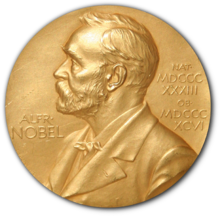|
1935 Nobel Prize in Literature
The 1935 Nobel Prize in Literature was not awarded after the Swedish Academy decided that no author in the field of literature was a suitable candidate.[1] Hence, the prize money for this year was 1⁄3 allocated to the Main Fund and 2⁄3 to the Special Fund of this prize section.[2] DeliberationsNominationsDespite no author(s) being awarded for the 1935 prize, numerous literary critics, societies and academics still sent nominations to the Nobel Committee of the Swedish Academy. In total, the Nobel Committee received 52 nominations for 38 authors like Frans Eemil Sillanpää (awarded in 1939), Johannes V. Jensen (awarded in 1944), Paul Valéry, Dmitry Merezhkovsky, Roger Martin du Gard (awarded in 1937) and H. G. Wells.[3] Fourteen of the nominees were newly recommended for the prize such as Shaul Tchernichovsky, Miguel de Unamuno, Jules Romains, John Masefield, Elise Richter, Edvarts Virza, Víctor Manuel Rendón, Émile Mâle, James Cousins and G. K. Chesterton. There were five women nominees: Ivana Brlić-Mažuranić, Violet Clifton, Ricarda Huch, Maria Madalena de Martel Patrício and Elise Richter.[3] The authors Henri Barbusse, Ioan Bianu, Arthur Hoey Davis (known as Steele Rudd), Clarence Day, Ella Loraine Dorsey, Charlotte Perkins Gilman, Anna Katharine Green, Kaitarō Hasegawa, Mary R. P. Hatch, Louise Manning Hodgkins, Winifred Holtby, Panait Istrati, T. E. Lawrence, James Leslie Mitchell (known as Lewis Grassic Gibbon), Violet Paget (known as Vernon Lee), Fernando Pessoa, Lizette Woodworth Reese, George William Russell, Tsubouchi Shōyō, Kurt Tucholsky, William Watson and Stanley G. Weinbaum died in 1935 without having been nominated for the prize.
Prize decisionIn 1935, the Nobel Committee shortlisted the authors Karel Čapek, Miguel de Unamuno, John Masefield, G. K. Chesterton and Roger Martin du Gard for the Nobel Prize in Literature. During the deliberations, Čapek was dismissed for political reasons[c]; De Unamuno, considered as one of the Spanish existentialist writers, was dismissed for his abstract ideas in his literary oeuvres; Masefield was dismissed for his uneven works; Du Gard was praised for his The Thibaults, but the committee decided to wait for its other volumes; and Chesterton, though praised by the committee for his English poems, was dismissed for "doubts over the religious non-fictional works like Saint Francis of Assisi and the biography of Jesus".[4] Without Chesterton's religious publications, the succeeding committee members believed he could have won the Nobel for that year. With the aforementioned evaluations, it was decided that no Nobel Prize will be given in the Literature category.[5][page needed][4] Notes
References
|
|||||||||||||||||||||||||||||||||||||||||||||||||||||||||||||||||||||||||||||||||||||||||||||||||||||||||||||||||||||||||||||||||||||||||||||||||||||||||||||||||||||||||||||||||||||||||||||||||||||||||||||||||

